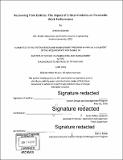| dc.contributor.advisor | Jonas Oddur Jonasson. | en_US |
| dc.contributor.author | Rizwan, Atikha | en_US |
| dc.contributor.other | Massachusetts Institute of Technology. Integrated Design and Management Program. | en_US |
| dc.date.accessioned | 2018-10-15T20:23:44Z | |
| dc.date.available | 2018-10-15T20:23:44Z | |
| dc.date.copyright | 2018 | en_US |
| dc.date.issued | 2018 | en_US |
| dc.identifier.uri | http://hdl.handle.net/1721.1/118524 | |
| dc.description | Thesis: S.M. in Engineering and Management, Massachusetts Institute of Technology, System Design and Management Program, 2018. | en_US |
| dc.description | Cataloged from PDF version of thesis. | en_US |
| dc.description | Includes bibliographical references (pages 35-36). | en_US |
| dc.description.abstract | In many service operations settings, the difficulty of jobs is unpredictable. Examples include police officers or paramedics routinely responding to calls with only limited understanding of the situations awaiting them. In such settings, a worker may occasionally encounter a critical incident (CI), defined as a task or situation which is sufficiently disturbing to challenge or overwhelm the workers' usual coping mechanisms. We study the impact of complex, stress-inducing tasks on operational task performance of the ambulance crew at the London Ambulance Services (LAS). Our metric for operational performance is cycle times, an important driver of system utilization. Shorter cycle times indicate better performance. From analyzing the LAS data, we found that following a Cl, a crew's cycle times increase and the effect gets worse for teams which face more CIs within the same shift. We find that this effect is non-uniform over sub-components of cycle times. In particular, the impact is more significant on operational performance of complex and less standardized tasks. We also did a robustness check for varying definitions of a Cl and the results hold and are consistent. | en_US |
| dc.description.statementofresponsibility | by Atikha Rizwan. | en_US |
| dc.format.extent | 36 pages | en_US |
| dc.language.iso | eng | en_US |
| dc.publisher | Massachusetts Institute of Technology | en_US |
| dc.rights | MIT theses are protected by copyright. They may be viewed, downloaded, or printed from this source but further reproduction or distribution in any format is prohibited without written permission. | en_US |
| dc.rights.uri | http://dspace.mit.edu/handle/1721.1/7582 | en_US |
| dc.subject | Engineering and Management Program. | en_US |
| dc.subject | Integrated Design and Management Program. | en_US |
| dc.title | Recovering from distress : the impact of critical incidents on paramedic work performance | en_US |
| dc.title.alternative | Impact of critical incidents on paramedic work performance | en_US |
| dc.type | Thesis | en_US |
| dc.description.degree | S.M. in Engineering and Management | en_US |
| dc.contributor.department | Massachusetts Institute of Technology. Engineering and Management Program | en_US |
| dc.contributor.department | Massachusetts Institute of Technology. Integrated Design and Management Program. | en_US |
| dc.identifier.oclc | 1054911120 | en_US |
